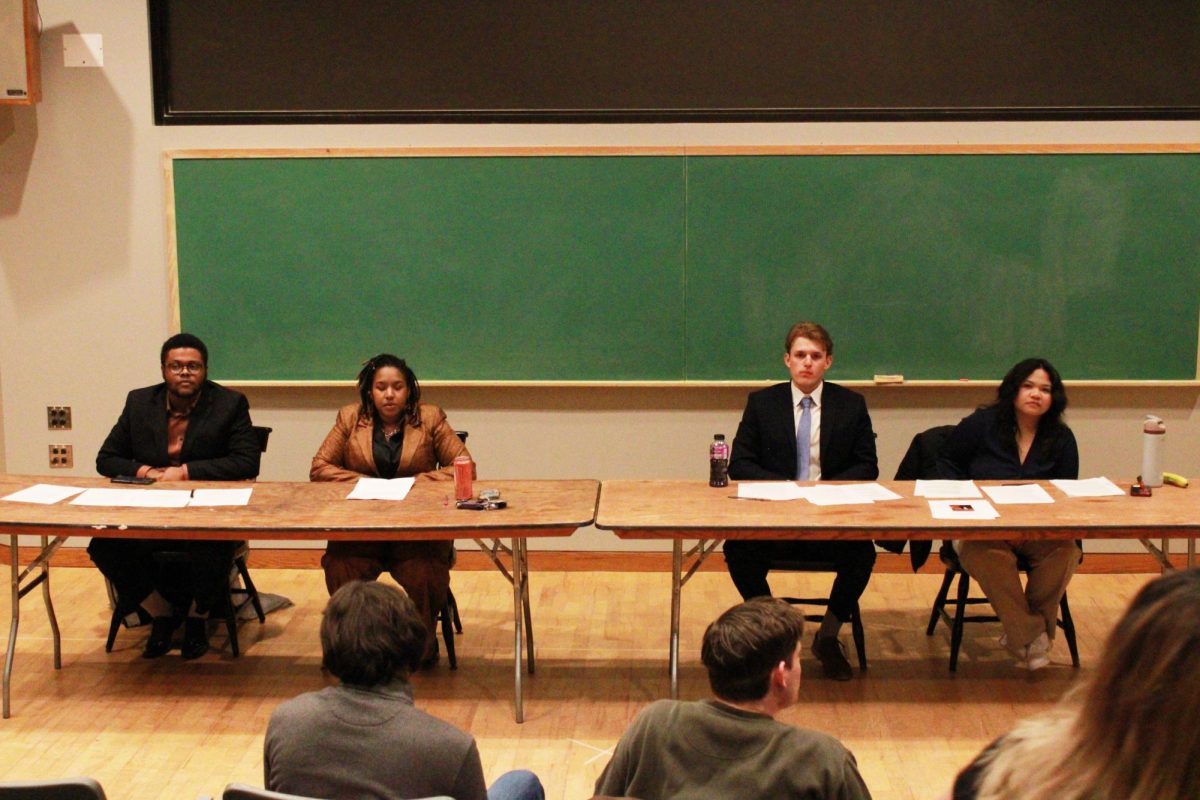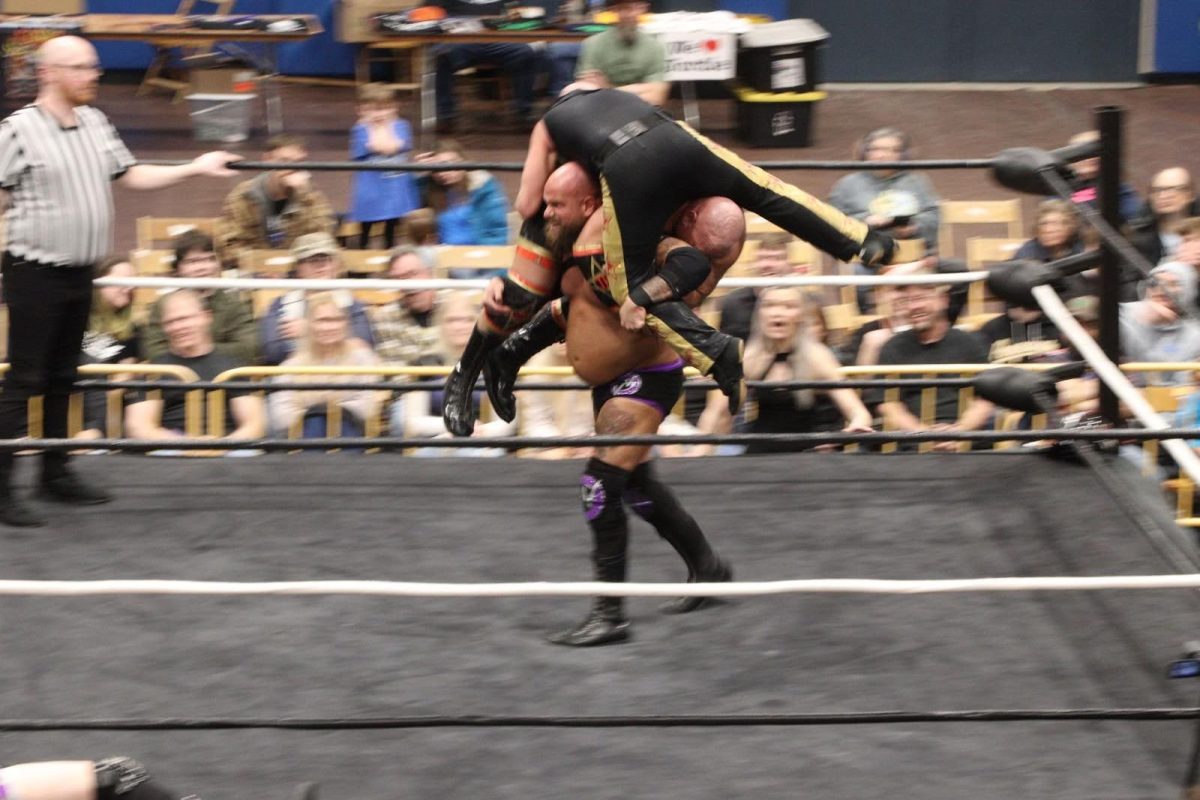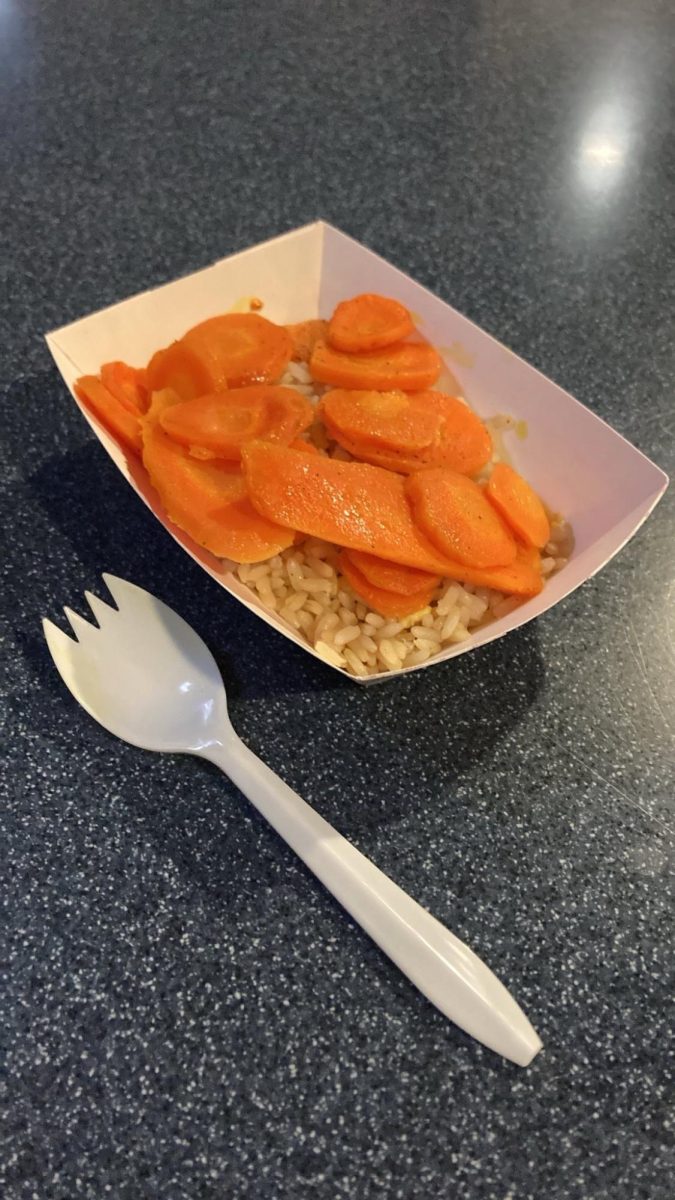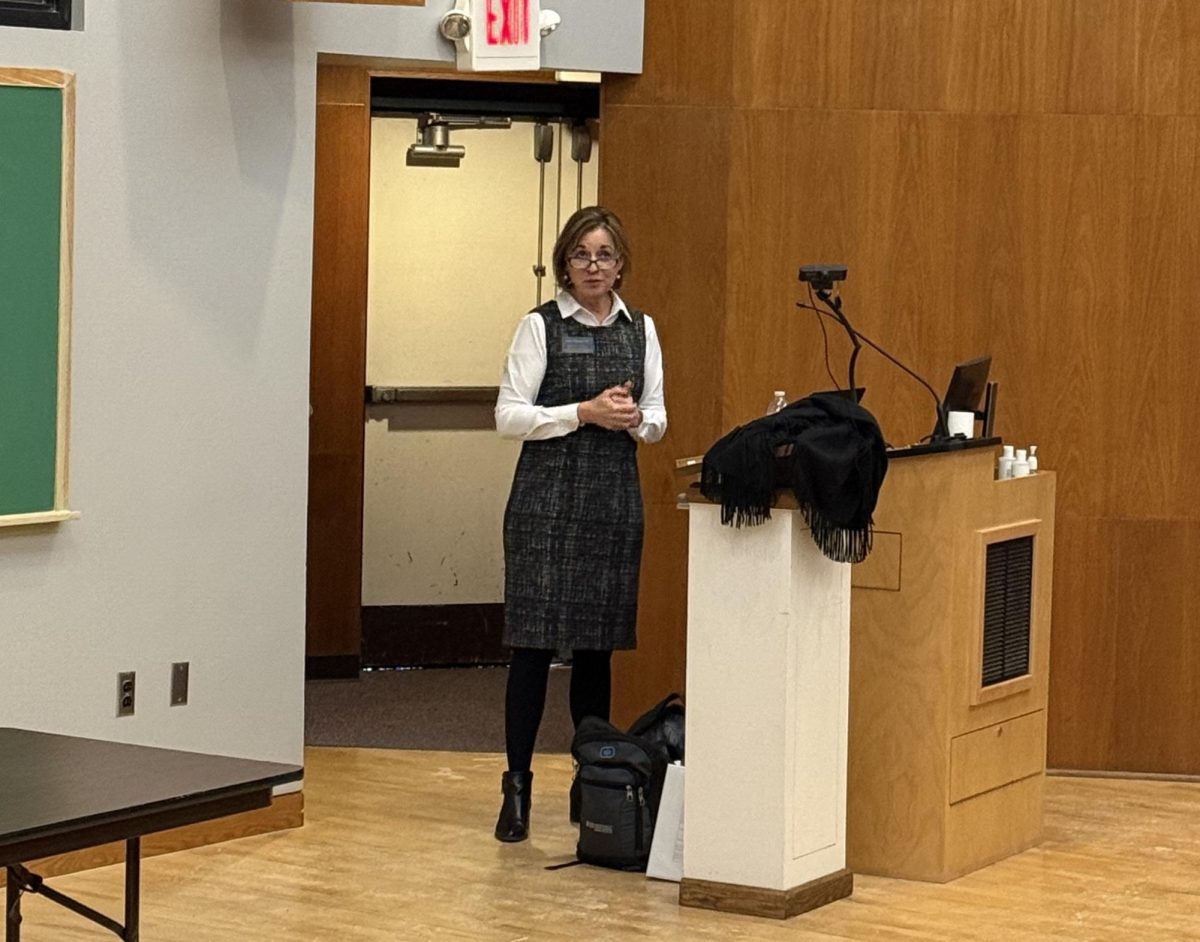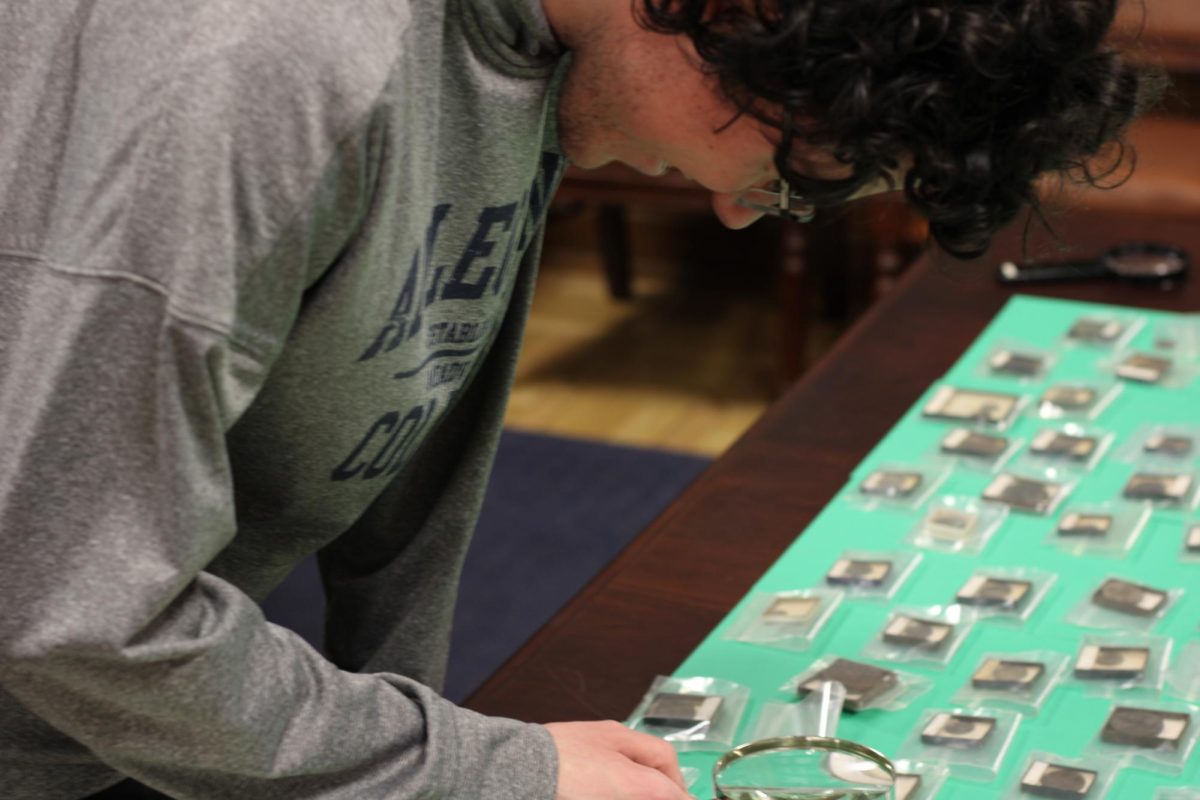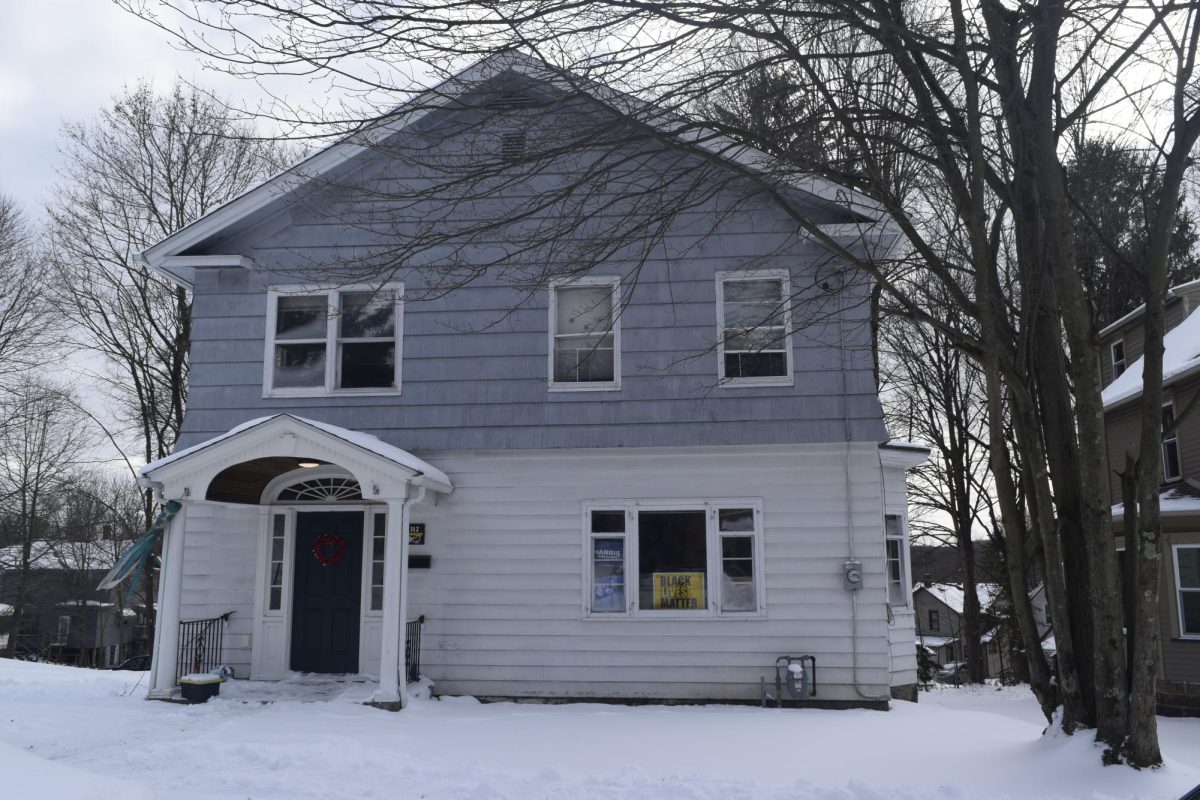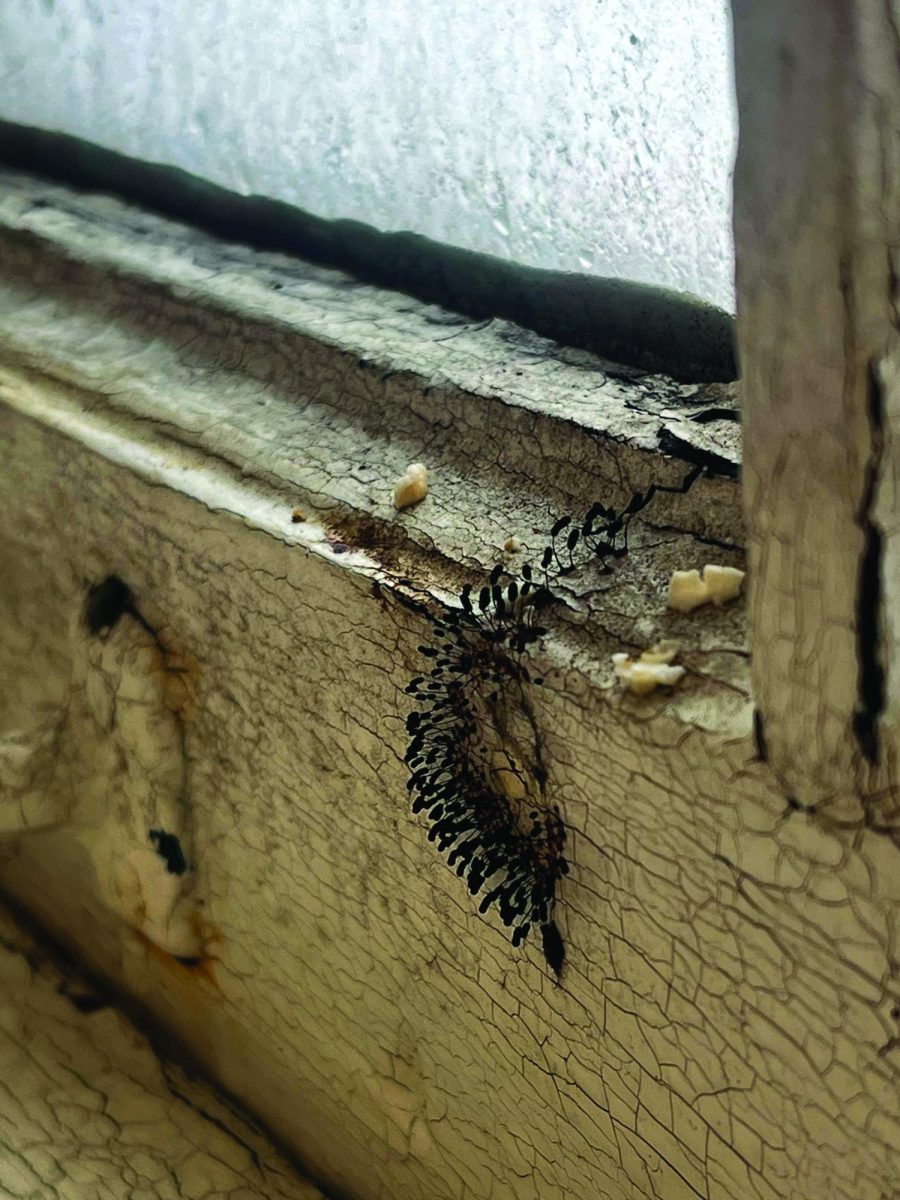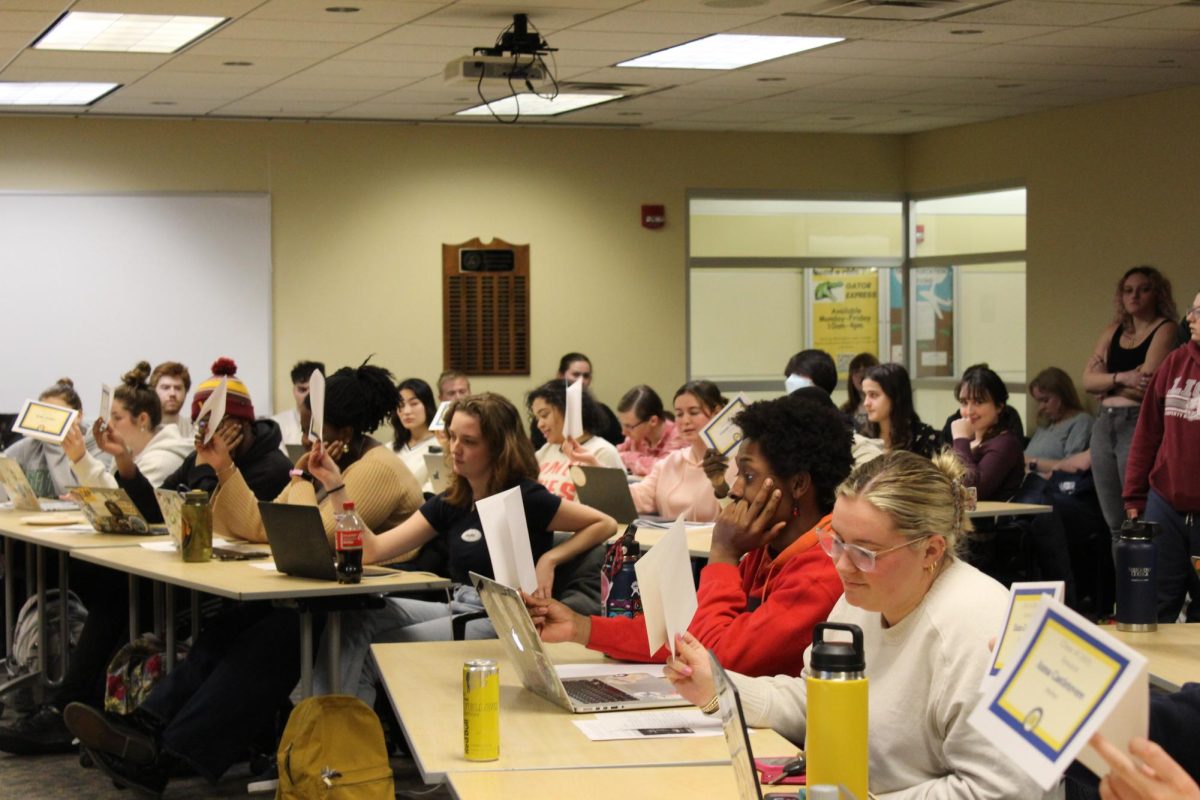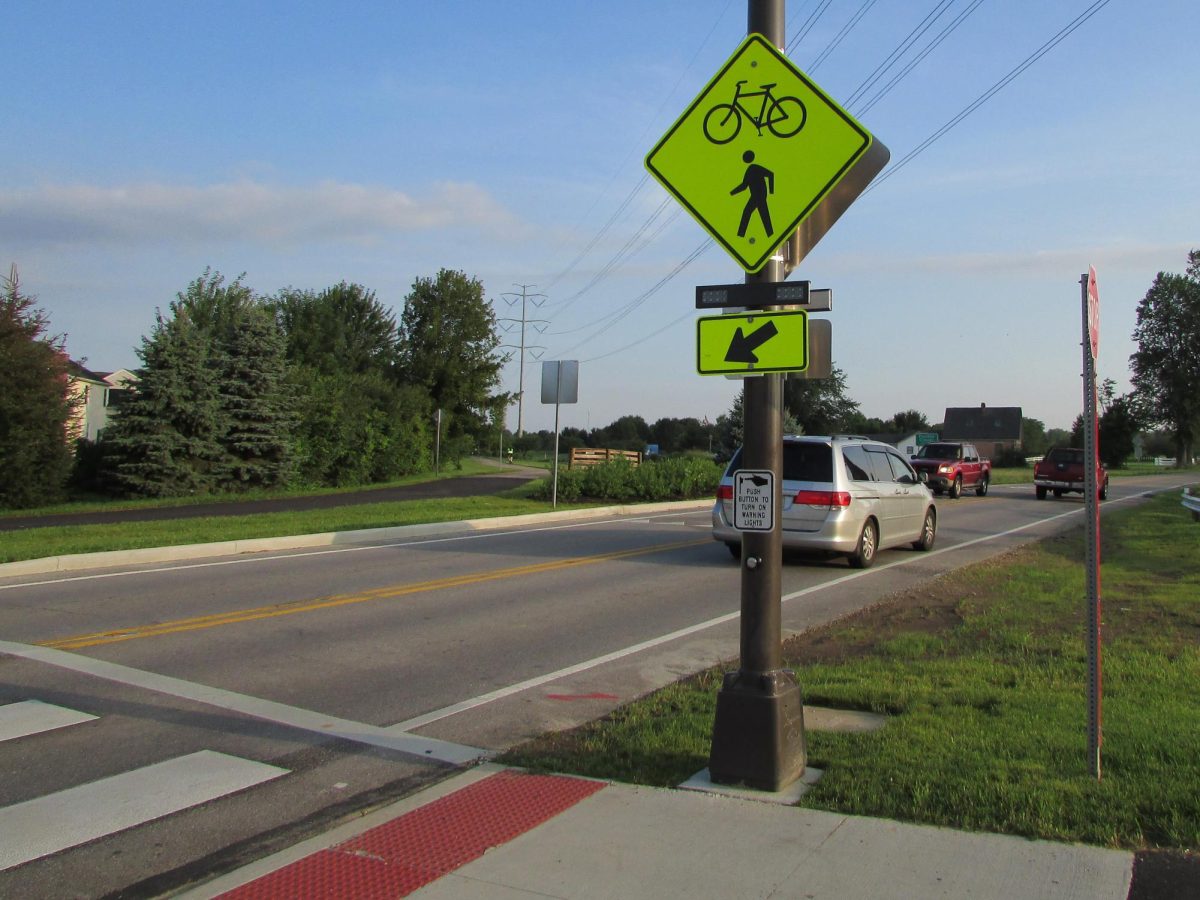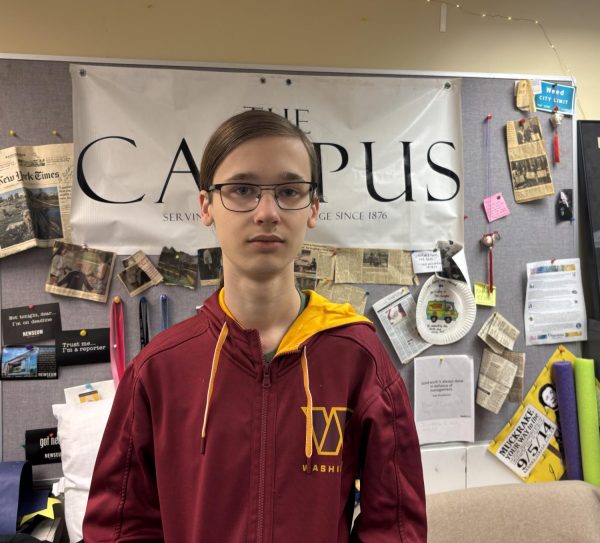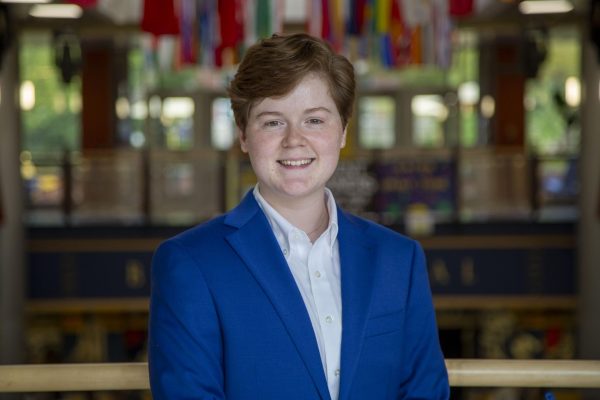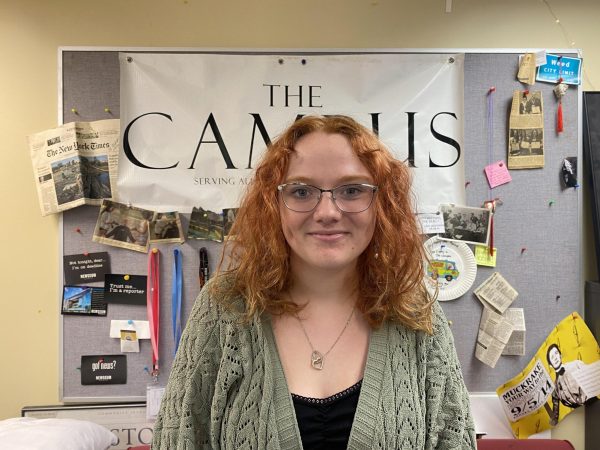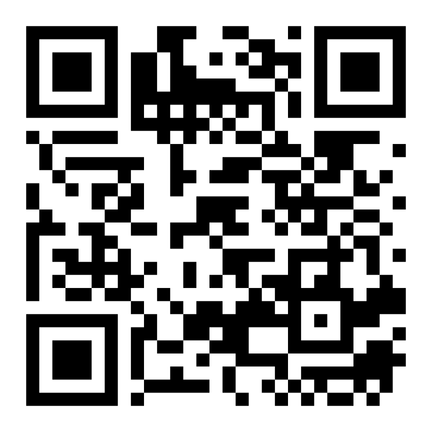
Allegheny Student Government hosted its annual presidential debate in Quigley Auditorium on Tuesday, March 25. The two tickets faced off in an hour-long discussion that delved into topics ranging from mental health and campus accessibility to increased efficiency and transparency within ASG.
Class of 2026 President Hailey Herring and Senator Gary Murray, ’26, are one ticket. This is Herring’s first year in ASG and Murray’s second as a senator.
Attorney General Chezka Quinola, ’27, and Director of Treasury Douglas Malcolm, ’27, make up the other ticket. Quinola served as a senator last year before joining the cabinet this year. This is Malcolm’s first year in ASG, having first been elected as a senator before joining the cabinet.
During the debate, the tickets answered several questions prepared by the moderator, Ben Stavnezer, ’27, co-editor-in-chief of The Campus, before responding to questions from the audience. The tickets alternated who responded first and were given one minute and thirty seconds to answer each question. Each ticket had three minutes to deliver opening and closing statements.
This debate transcription has been edited for length and clarity.
Opening Statements
Chezka Quinola: Doug and I are here tonight because we believe in something bigger than ourselves. We believe in leadership that listens. Leadership that works alongside students. Leadership that doesn’t just acknowledge challenges, but actively finds solutions. We understand that there are things we can work on together, whether it’s improving funding efficiency, increasing campus accessibility or ensuring that every student has the resources they need. We’re not here to dwell on obstacles. We’re here to be proactive, to collaborate and to push for the changes that will make Allegheny better for everyone.
Despite our different backgrounds — Doug as a student-athlete and me as an international student — we realized that we share the same vision for ASG. We may come from different experiences, but that only makes our team stronger. We know that every student at Allegheny has a different story to tell, different challenges and different goals. That’s why representation and accessibility matter. We want ASG to reflect the diversity of this campus, to hear every voice and to make sure no student feels like concerns are unheard.
Our goal is to build on the efforts of those before us, to take the conversations that have already started and turn them into tangible outcomes. Doug and I are committed to working through the proper channels, building relationships and ensuring that students don’t just feel heard, but that they see results. We’re here to collaborate with ASG, with the administration and most importantly, with all of you. We’re excited to share our ideas, to introduce solutions that bring efficiency, accessibility and innovation to student life. Doug and I are asking for your trust because we are ready to lead with action, with collaboration and with leadership that listens.
Hailey Herring: Dear Allegheny students, I stand here before you serving as a resident advisor, a club president, an ASG member and as a friend. Not only do I dedicate my time to the students of Allegheny, but also as a patron for the Meadville citizens, using any time I can to work as an intern and part-time at a local preschool. My running mate and I stand here before you asking that you take into consideration our experience, struggles and passion for these positions. Allow Gary Murray and I to take into consideration all the struggles of being a student and the systematic challenges that are in place in order to change our future.
Vote for Gary and I because we will bring more than intelligence. We are truly passionate about helping our peers, staff and future students. (We are) planning to bring service and community to the school and Meadville community. In the spirit of our motto — leadership, service, dedication — we plan to provide for the student body the changes we all hope to see: more inclusive environments, better living conditions and better resources are on the top of our minds. Allow me the opportunity to show you that I can help mend the bridge between ASG, faculty and students.
Gary Murray: I’m confident in our ability to uphold our agenda and the reputation of ASG. I’m in the class of 2026 from Washington D.C., the second oldest of eight children and a Bonner Scholar. I was on ASG as a freshman. I’ve been able to work with nonprofits like the Meadville Public Library, Women’s Services and Clean Slate. With these opportunities, I’ve been able to build my experience here.
I am truly passionate about bringing a more community-oriented environment here not just to Allegheny, but to the student experience. I’m looking forward to showing you all our passion, our dedication. We(Herring and I) have been friends since freshman year, and I wouldn’t say that we thought we would be here right now. But when we saw that there was a need, we stood up.
Moderator Questions
Ben Stavnezer: What will your ticket do to ensure that all voices are heard in regards to student issues, especially organizations, clubs and student demographics that have historically been overlooked or underrepresented?
Herring: We thought about creating more student opportunities through more college and outside community partnerships. We want to work with different departments and make sure everyone’s being heard in clubs and different departments so that we can ensure that Allegheny College is going into the right path.
Murray: We are focused on creating a more open governing body and also building more of a community amongst all of us. More of a dialogue and also making sure things are efficient. The only way we can do that is by working with you all and hearing your voices.
Douglas Malcolm: When we think about being inclusive for all students, the first thing that comes to mind is accessibility for everyone on campus. There’s multiple residential halls and campus buildings that do not provide access for all students. We plan to implement accessibility through every building with portable ramps for all wheelchairs and all people that cannot walk up a flight of stairs.
Quinola: We’re also trying to implement better digital access. We have all these platforms online, and especially now, (we) want to utilize all our platforms that ASG is paying for. This is the money you’re paying for that we’re not utilizing enough.
Stavnezer: What initiatives does your ticket plan to implement if you’re elected?
Quinola: We have a bunch of initiatives already. Once we’re elected, we have plans to work with (Wellness Case Manager) Josh Guthrie to bring more counselors and low-cost therapy to Allegheny.
One of our biggest ideas is to utilize this digital era by creating this platform where clubs are able to receive financial request decisions in real time the second they submit their finance request. My background in software engineering allows this where your system is able to give you an answer based off of everything you filled out if you filled out all the details properly. I’ve talked to a lot of computer science students, a lot of the professors in the computer science department, and it’s completely possible.
Herring: A large concern of ours is mental health resources here on campus. A student recently brought up to me that there used to be a choice for a group for independent therapy here at Allegheny, and I hope to bring that back for students who need it and prefer that form of therapy. I also hope to work with the therapists here at Allegheny to ensure better communication and support for the therapists. I’d like to ensure they aren’t overwhelmed by the number of students.
Murray: Mental health isn’t something we feel like we should shy away from. Just because COVID is starting to lessen up, just because it’s not a concern of higher bodies anymore, we still feel like we need to be advertising 98.6 and also using some of those strategizing things and our administration also help mental health.
Some other things we’ve been thinking about implementing is mass polling our student body on issues they’re dealing with and their opinion on how to fix them, having a town hall at least once a semester with ASG to make it a more inclusive governing body and also improving the modernization of how ASG is doing media.
Stavnezer: What are your plans for making ASG and ASG General Assemblies more accessible to the general student population? And what would you do to reach people who do not think they can normally speak up to ASG?
Murray: We had a busy GA this year as we were introducing clubs, and it was amazing to allow our constituents to speak. We don’t see constituents often, but when we do, we value it a lot. This is why we decided to figure out how to get ASG to do a town hall because while GAs are something we do, we wanted to make sure we could provide more access. Also, something we did my freshman year, is GA livestreams. We want to make sure we continue to do that and make sure that our student body is driving our student government.
Malcolm: Gary makes a great point with open town halls and having constituents come and share their ideas (in) not as much of a formal setting. One of the ideas we are going to implement if elected is having suggestion boxes around campus for student government, because it is scary to go into a GA with a bunch of people that you may or may not know and voice your opinion on something that you could or could not be completely informed on. We would create a public response system so that people could see on GatorHub or through email what comments were in the suggestion boxes and what ASG is doing to address those comments so that everybody who is on campus can have their thoughts and their feedback heard and represented through our student government.
Stavnezer: How will you, as candidates, handle your position on ASG with the other responsibilities that you have?
Quinola: Doug is a student-athlete and I’m involved as an RA and a lot more clubs aside from ASG, but we want you to know that for us, ASG is a priority. ASG isn’t just another club we’re trying to do. We know how important, how much time commitment ASG needs. We’ve been through it. This is my second year here and Doug’s been here the whole year. If we require having late nights, to have meetings during lunch, during our own free time, we’re willing to do it because that’s a commitment that we’re trying to bring to ASG.
Malcolm: I’m a student-athlete, so it can be difficult. But I have spoken with all three of my coaches about this campaign and what I’m looking to do. As Chezka stated, it’s a priority. I wouldn’t be up here if it wasn’t. Throughout the year, I have found ways to make sure my time is put in the right places and that ASG comes first, especially in the role of director of treasury. Communication with coaches and professors is how I’ve done it.
Herring: My work ethic is very strong and I enjoy working very hard. ASG makes me feel like I have a purpose here at Allegheny, and it ensures that I can also help share the voices of my peers. It’s something that I’m very passionate about, to help others and ensure we will get a better future no matter what we’re fighting for. I believe that no matter what struggles or challenges will with this upcoming campaign and potential presidency, it will be manageable and it will be enjoyable because I enjoy helping and being here at Allegheny College. That’s all that matters to me.
Murray: We all can relate to being very busy, from student-athletes to Bonners like myself. I spend a lot of my time working in the community helping people in need, whether it’s formerly incarcerated individuals or teens in town that just need activities to do. Obviously, there’s a lot that is going on around us. And I’m also a double major in political science and history. So, of course, things can get rough. But I’ve also put myself in a position where I know I can handle the position of the vice presidency. I have been able to do all my work up until this point, work hard, build programs here, and know that I can continue to do more and more.
Stavnezer: What are you looking for in your cabinet members, and how will you work with them to successfully complete your goals?
Herring: We’re all looking for cabinet members that are going to be committed to their job and willing to go the extra mile to make sure we’re getting what we need to do done. Someone who’s going to put ASG at a priority. Making sure they are someone who’s kind and caring for this community and wanting to do better and wanting to do more for us all.
Murray: We’re focused on building community on campus and abroad, on innovating student life, promoting mental health support and most importantly, creating a more open and governing body. We want to make sure our cabinet members embody those things. We want to make sure they have that work ethic. We know we can put good people in place that are committed to you all.
Quinola: ASG is looking for people that are very committed. Student government takes up a lot of time. ASG isn’t just a two-man game. It doesn’t just depend on Doug and I’s time management or our schedules. It also depends on our cabinet and our senators’ time schedules. Everyone’s busy, and time is a very hard thing to find these days. But we’re committed to making workarounds, like having Google Meets or anything digital. Cabinet members should be devoted and really passionate about ASG just like Doug and I are. We want to be the role model for anyone that’s interested in applying in ASG.
Malcolm: (We are) looking for dedicated people who are willing to give their time to push Allegheny in the right direction and put our student government and student body in the right direction.
Stavnezer: If elected, how does your ticket plan to be efficient given the means of how ASG works within the college?
Malcolm: We plan on, this summer, completely mapping out what our timeline is for different projects and coming into the school year with a completely digitalized financial system so that finance requests are processed quicker and people can make sure their clubs are safe and secure and in a good position to succeed.
Quinola: We know that one of the biggest things ASG is struggling with is the speed of finance requests and the speed ASG or the Finance Committee gets back to you. We’re trying to expedite the process while still maintaining the same rules, the same (things) that we have to look for within the finance request by at least giving people the chance to plan their events or change up their finance request just as fast as they are able to get their money.
Murray: We want to make sure that finances not only are efficient, that they’re digitized, (but) that we don’t have to keep doing the same thing over and over again every year, putting the same burden on a different administration. I’ve been on Rules Committee, I’ve worked with attorney generals and it’s not just the finances. It’s from every committee, how they pass things down to the next person. We want to make sure we have things organized. We want to make sure also that we’re putting the right people in place that are working with finances. We have a lot of clubs here and it does take a strong person to work with as many people, to work with so many documents and numbers. We want to make sure that things are efficient, to make sure that we do put in plans like Doug and Chezka have, but also make sure that that is unanimous and uniform among every single cabinet.
Stavnezer: If you are elected, what is an internal ASG issue that you would work to resolve?
Herring: My number one priority would be communication, not only to faculty, but also between students and cabinet members. Within my time at ASG, it has been very organized for the most part, but I struggled the most with finding the time to communicate with my peers and other cabinet members when it came to issues I was coming up against. Communication would be my number one goal.
Murray: Definitely, communication in every format. Because me and Hailey, we’re seniors — I want to make sure this is something that is happening after us. As a freshman, we approached communication concerns with programs we wanted to work with, like the therapy dog program we were able to bring back here. The reason why they didn’t want to work with Allegheny students anymore was because of a lack of communication. As somebody that works in the Meadville community, this is something I see from every nonprofit organization. This is something we’re planning to mend, that we’re communicating with the people that bring their programs here. And that we’re also having transparent communication with our clubs, through finances and anything else.
Malcolm: Having transparent communication is our number one priority through ASG, making sure that students and faculty alike are aware of the ongoings of ASG and what ASG is. Having the centralized digital hub like we have on GatorHub and being able to post minutes weekly that are easily accessible for students and faculty so that people can be aware of what’s going on. Just to make sure everyone has the same opportunities through transparent communication.
Quinola: We know how a lot of people, especially incoming freshmen, don’t really know what ASG is. We also plan on working with admissions during orientation or during early days to boost ASG through tabling, admitted students days, through all these different events admissions holds in order to spread the word about ASG and what we are and not just what you hear around or what you think it is.
Stavnezer: Both campaign platforms talk about support for inclusivity, campus connection, increased accountability and accessibility, and other student issues. What makes a vote for your ticket different from a vote for the other ticket?
Quinola: What sets us apart is the fact that we have plans. Along with those plans, we already have solutions in place for them. When we’re elected, from day one we’re going to start working on these plans that we’ve already come up with. We’ve come up with the idea to have collaboration grants, a separate form of funding for clubs to be able to connect with other clubs. This is a way your club can collaborate with another club and work with people other than the people you know and get access to more funding, to expedited finance request decisions. This is an easy fix to what we’re dealing with, especially with finance requests. This helps the student body come together in unity with different clubs and different people from different backgrounds. Events through this would also be a lot more well-structured, a lot bigger and a lot more important than all the small events that could be happening.
Malcolm: Bridging the gap between student-athletes and the general student body is a big concern for us because, in my opinion, there seems to be a bit of a divide between students and student-athletes on campus. Creating collaborative events between teams and clubs would really bring together that divide and bring us all together as a community.
Herring: I agree with Chezka and Doug. However, I believe we can add onto that by making sure we appoint the right cabinet positions to the correct people. And by working with people like Chezka and Doug to make sure things like this get done and that everything works efficiently in the way that we need it to.
Murray: Appointing cabinet positions, that’s something we have to do within our first week. That’s going to help us with efficiency. As soon as we’re able to appoint people, we’re going to be able to start putting in these plans that we’ve set up, our unique plans — and also some of our peers’ unique plans. Because everything we’ve talked about here, things I’ve heard within the student body, these are all good ideas. This is something that we feel like we can implement if we get started.
I feel like that’s what separates us. What separates us is that we have a deep experience within the community, with numerous of our peers and with experience in practicing this efficiency, making sure we’re upholding all of our positions and doing things to the utmost degree.
Audience Questions
Stavnezer: Since the MyAllegheny emails have ended, clubs and student organizations have noticed a drop in engagement. How will you ensure that the campus community is still engaged with campus organizations and that the information is shared in a way that reaches all students?
Herring: I definitely acknowledge that that has been a big upset recently on campus, and I completely understand. But I personally feel like GatorHub is a great place to find all of your information in one spot. Although it is kind of difficult to go around sometimes, it is very efficient to putting out those reminders of your events and posting up your posters and your minutes. Also, there are opportunities to put your posters up in places like the Student Life Suite where you can put it on the TV, and you can also ask Allegheny to post it on their Instagram. There are options out there to advertise, but we definitely want to work on getting that advertisement out there and being more transparent.
Quinola: Hailey and Gary made a great point about the utilization of Gator Hub. Beyond that, the biggest platforms people are on, aside from Gator Hub, are social media: Instagram, TikTok, Discord. All of these social media platforms that Allegheny isn’t really utilizing. ASG’s Instagram account, we’re utilizing that a lot more next year. We’re able to promote clubs better. Not just ASG and ASG’s agendas, but also other clubs. We’re also trying to push for a calendar where everyone can put in club events, like the one that you see on GatorHub. These small things also help with the big sustainability issue when using paper to advertise events.
Stavnezer: What part of Allegheny do you feel is the weakest, and how do you plan to approach that and fix it?
Quinola: We’ve noticed there’s been a massive upset with dining, especially with the portion sizes being a lot smaller this semester for some random reason. We understand that the portion sizes are to minimize food waste around campus. Dining doesn’t only just come with the student body because of portion sizes. Dining matters when it comes to the person that you are, if you’re a student-athlete who needs to eat more, if you’re a person that has specific dietary requirements, we don’t offer that kind of cultural diversity that we could be offering. ASG doesn’t have a lot of say in what food we have or what we can do with board swipes, but we are here to advocate with admissions, with administrators and with Parkhurst. We’re here to talk about what we really want to change, not just what we’re trying to plan and what we’re trying to do.
Murray: On top of dining, I would also just generalize student life. We need to focus more on innovating student life. Something we did at GA not too long ago was approve the ability for there to be renovations for an elevator in Brooks. We want to make sure we’re working on stuff like that, that we are being advocates for you directly to the cabinet.
We want to make sure we’re communicating. I’m a big communication guy. Anybody here can come and talk to me and tell me about things they feel like in their student life they need to be better. Like with the portions. Especially student-athletes, being right next to Wise (Center), they depend on not needing to go back for three bowls of food. That’s something that we want to make sure we’re advocating for.
Herring: We’d like to combat the isolation on campus. We have a few ideas under our belt that we’re thinking about.
Stavnezer: What aspect of your past leadership experience, ASG or otherwise, has taught you the most, and what will that bring to your administration?
Herring: I have a long history of leadership positions, such as being in charge and teaching at an equestrian barn back home that I started at when I was 11. It’s set me up and made me very passionate about just helping people and overall just being driven and hard-working because, I don’t know if anyone else here rides horses or deals with horses, but you have to dedicate a lot of hard work. It’s very much something that has taught me to be in the position I am now, in the place that am now, to ensure that I want to do this, that I am dedicated to you and ASG.
Murray: Another thing I’ve learned from ASG is how to work with a governing body. This is something I haven’t had the privilege of having in other schools. But working with nonprofits, working in other leadership positions, I have done town halls with JMU production back home in D.C. I’ve worked with students on talking about social issues. I’ve been doing this since 13 and I want to keep it going.
Quinola: One of my most recent leadership experiences is being an RA in Baldwin Hall. We all know how hard it is to deal with freshmen. They all have homesickness, being isolated and all these different kinds of problems that freshmen have. I’ve been through it. These are issues we’re trying to address and issues I’ve helped my freshmen and other freshmen with.
We’ve noticed one of the biggest problems with anything are (times) the events are being held.
Malcolm: Being an athlete my whole life and being a part of a team really taught me how to lead and be with a team because, end of the day, ASG is a team.
Closing Statements
Murray: Thank you all for being here. I appreciate you all for hearing us out, for giving us a chance, for considering our ticket. Hailey and I have had the pleasure of making it to our senior year here at Allegheny, and we’ve met a lot of people that haven’t made it this far. We’ve built the most of our Allegheny advantage. Myself, I’ve grown to love the uniqueness of this campus, of our institution and the community around us. You all. I’ve had the opportunity to work with nonprofits and community organizations, from building teen activity groups at the Meadville Public Library to helping build a Clean Slate legal partnership program here at the college. I’ve had the opportunity to be a Bonner and work with people I would have never had the opportunity of meeting if I didn’t have the chance to be here. I want to make sure that I have the chance to bring more of that experience, my perspectives here to ASG and to you all.
Herring: I was very nervous for tonight, and I hope that I see all of your beautiful faces around campus again because this was very much a wonderful experience for me. No matter how the election goes, I really did appreciate this experience and this moment. I just want you to keep into consideration that me and Gary are here because we want to be here. We are passionate about being here and we want to be up here because we want to make sure that Allegheny goes on the right path and that the future students that come to us will be set up for success.
Malcolm: To my fellow students, faculty and administration, your time and attention mean everything. Your presence tonight shows a commitment to shaping the future of our student government. Active participation like this drives real change, and for that, we are extremely grateful. Thank you for a lot of ideas.
But at the end of the day, what really matters isn’t just words, it’s action. As leaders on campus, we understand that it’s leadership that delivers real results. Leadership that listens. Leadership that fights for you and makes sure that every student’s voice is heard. That’s the leadership Chezka and I are ready to bring to ASG.
We’re bringing more than just ideas. We’re bringing the experience and knowledge to turn them into real, tangible change. We understand the processes and the steps needed and how to navigate the challenges to make these things happen. ASG thrives when vision is paired with action and we are ready to lead with both. That’s what makes us uniquely prepared to serve.
By being a part of ASG in leadership positions, we both understand the different frustrations that students have with ASG. We know what works and what doesn’t. As director of treasury, I have worked to ensure that student organizations receive the funding they need. Chezka, as attorney general, has worked to amplify student voices, ensuring fairness and accountability. By learning through these positions, we know what people need firsthand and we’re ready to act.
We will push for clearer and more accessible financial reports, faster and more efficient funding for student organizations, and real improvements on campus, including accessibility and dining, and stronger partnerships between students, clubs, and administration. These aren’t just promises — they are steps we are ready to take immediately. Our platform is not just a list of proposals, it’s a commitment to action, a promise to advocate for the needs of our fellow students, and a pledge to build a more inclusive campus.
To our first-year students, we want you to feel welcomed and encouraged to make Allegheny your home. To the sophomores, we want you to feel supported to step further into leadership positions here on campus. To the juniors, we want you to feel confident in shaping your Allegheny experience in the way you can. To our seniors, we want you to leave Allegheny knowing that your impact has helped create a stronger and more tight-knit community.
Chezka and I hope you leave tonight with a clearer vision of our goals, our dedication, and the values that drive us. We are not here to maintain the status quo. We’re here to transform it. We are the most prepared, most experienced, and most capable of leading ASG forward. We know how things work, we know what needs to be done, and we will get it done. If you believe in real change, if you believe in a student government that puts students first, then we’re your team.
Voting for the General Election will open Wednesday, March 26, and run until Friday, April 4 at 9 p.m., with the winning ticket announced by the night of Sunday, April 6.
Use this link to access the form, or scan the QR code at the top of this page.




